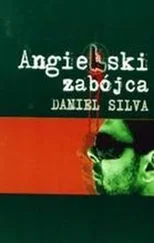Daniel Silva - Prince of fire
Здесь есть возможность читать онлайн «Daniel Silva - Prince of fire» весь текст электронной книги совершенно бесплатно (целиком полную версию без сокращений). В некоторых случаях можно слушать аудио, скачать через торрент в формате fb2 и присутствует краткое содержание. Жанр: Шпионский детектив, на английском языке. Описание произведения, (предисловие) а так же отзывы посетителей доступны на портале библиотеки ЛибКат.
- Название:Prince of fire
- Автор:
- Жанр:
- Год:неизвестен
- ISBN:нет данных
- Рейтинг книги:5 / 5. Голосов: 1
-
Избранное:Добавить в избранное
- Отзывы:
-
Ваша оценка:
- 100
- 1
- 2
- 3
- 4
- 5
Prince of fire: краткое содержание, описание и аннотация
Предлагаем к чтению аннотацию, описание, краткое содержание или предисловие (зависит от того, что написал сам автор книги «Prince of fire»). Если вы не нашли необходимую информацию о книге — напишите в комментариях, мы постараемся отыскать её.
Prince of fire — читать онлайн бесплатно полную книгу (весь текст) целиком
Ниже представлен текст книги, разбитый по страницам. Система сохранения места последней прочитанной страницы, позволяет с удобством читать онлайн бесплатно книгу «Prince of fire», без необходимости каждый раз заново искать на чём Вы остановились. Поставьте закладку, и сможете в любой момент перейти на страницу, на которой закончили чтение.
Интервал:
Закладка:
One by one, the others were brought before the committee as well, first Yossi and Rimona, then Yaakov and lastly Dina, whose discoveries had fueled the investigation into Khaled in the first place. It pained Gabriel to see them in the dock. His career was over, but for the others the Khaled affair, as it had become known, would leave a black mark on their records that would never be expunged.
In the late afternoon, when the committee had adjourned, he would drive to Mount Herzl to spend time with Leah. Sometimes they would sit in her room; and sometimes, if there was still light, he would place her in a wheelchair and push her slowly round the grounds. She never failed to acknowledge his presence and usually managed to speak a few words to him. Her hallucinatory journeys to Vienna became less apparent, though he was never certain precisely what she was thinking.
“Where is Dani buried?” she asked once, as they sat beneath the canopy of a pine tree.
“The Mount of Olives.”
“Will you take me there sometime?”
“If your doctor says it’s all right.”
Once, Chiara accompanied him to the hospital. As they entered, she sat down in the lobby and told Gabriel to take his time.
“Would you like to meet her?” Chiara had never seen Leah.
“No,” she said, “I think it’s better if I wait here. Not for my sake, for hers.”
“She won’t know.”
“She’ll know, Gabriel. A woman always knows when a man’s in love with someone else.”
They never quarreled about Leah again. Their battle, from that point onward, was a black operation, a covert affair waged by long silences and remarks edged with double meaning. Chiara never entered their bed without first checking to see whether the papers had been signed. Her lovemaking was as confrontational as her silences. My body is intact, she seemed to be saying to him. I’m real, Leah is only a memory.
The apartment grew claustrophobic, so they took to eating out. Some evenings they walked over to Ben-Yehuda Street-or to Mona, a trendy restaurant that was actually located in the cellar of the old campus of the Bezalel Academy of Art. One evening they drove down Highway One to Abu Ghosh, one of the only Arab villages along the road to survive the expulsions of Plan Dalet. They ate hummus and grilled lamb in an outdoor restaurant in the village square, and for a few moments it was possible to imagine how different things might have been had Khaled’s grandfather not turned the road into a killing zone. Chiara marked the occasion by buying Gabriel an expensive bracelet from a village silversmith. The next evening, on King George Street, she bought him a silver watch to match. Keepsakes, she called them. Tokens by which to remember me.
When they returned home that night, there was a message on the answering machine. Gabriel pressed the playback button and heard the voice of Dina Sarid, telling him that she’d found someone who had been there the night Sumayriyya fell.
The following afternoon, when the committee had adjourned, Gabriel drove to Sheinkin Street and collected Dina and Yaakov from an outdoor cafe. They drove north along the coast highway through dusty pink light, past Herzliyya and Netanya. A few miles beyond Caesarea, the slopes of Mount Carmel rose before them. They rounded the Bay of Haifa and headed for Akko. Gabriel, as he continued north toward Nahariyya, thought of Operation Ben-Ami-the night a column of Haganah came up this very road with orders to demolish the Arab villages of the Western Galilee. Just then he glimpsed a strange conical structure, stark and gleaming white, rising above the green blanket of an orange grove. The unusual building, Gabriel knew, was the children’s memorial at Yad Layeled, a museum of Holocaust remembrance at Kibbutz Lohamei Ha’Getaot. The settlement had been founded after the war by survivors of the Warsaw Ghetto uprising. Adjacent to the edge of the kibbutz, and barely visible in the tall wild grass, were the ruins of Sumayriyya.
He turned onto a local road and followed it inland. Dusk was fast approaching as they entered al-Makr. Gabriel stopped on the main street and, with the engine still running, entered a coffeehouse and asked the proprietor for directions to the house of Hamzah al-Samara. A moment of silence followed while the Arab appraised Gabriel coolly from the opposite side of the counter. Clearly he assumed the Jewish visitor to be a Shabak officer, an impression Gabriel made no effort to correct. The Arab led Gabriel back into the street and, with a series of points and gestures, showed him the way.
The house was the largest in the village. It seemed several generations of al-Samaras lived there, because there were a number of small children playing in the small dusty courtyard. Seated in the center was an old man. He wore a gray galabia and white kaffiyeh and was puffing on a water pipe. Gabriel and Yaakov stood at the open side of the courtyard and waited for permission to enter. Dina remained in the car; the old man, Gabriel knew, would never speak forthrightly in the presence of a bareheaded Jewess.
Al-Samara looked up and, with a desultory wave of his hand, beckoned them. He spoke a few words to the oldest of the children and a moment later two more chairs appeared. Then a woman came, a daughter perhaps, and brought three glasses of tea. All this before Gabriel had even explained to him the purpose of his visit. They sat in silence for a moment, sipping their tea and listening to the buzz of cicadas in the surrounding fields. A goat trotted into the courtyard and gently butted Gabriel’s ankle. A child, robed and barefoot, shooed the animal away. Time, it seemed, had stopped. Were it not for the electric lights coming on in the house, and the satellite dish atop the roof, Gabriel would have found it easy to imagine that Palestine was still ruled from Constantinople.
“Have I done something wrong?” the old man asked in Arabic. It was the first assumption of many Arabs when two tough-looking men from the government arrived uninvited at their door.
“No,” Gabriel said, “we just wanted to talk to you.”
“About what?”
The old man, hearing Gabriel’s answer, drew thoughtfully on his water pipe. He had hypnotic gray eyes and a neat mustache. His sandaled feet looked as though they had never seen a pumice stone.
“Where are you from?” he asked.
“The Valley of Jezreel,” Gabriel replied.
Al-Samara nodded slowly. “And before that?”
“My parents came from Germany.”
The gray eyes moved from Gabriel to Yaakov.
“And you?”
“Hadera.”
“And before?”
“Russia.”
“Germans and Russians,” al-Samara said, shaking his head. “Were it not for Germans and Russians, I’d still be living in Sumayriyya, instead of here in al-Makr.”
“You were there the night the village fell?”
“Not exactly. I was walking in a field near the village.” He paused and added conspiratorially: “With a girl.”
“And when the raid started?”
“We hid in the fields and watched our families walking to the north toward Lebanon. We saw the Jewish sappers dynamiting our homes. We stayed in the field all the next day. When the darkness came again, we walked here to al-Makr. The rest of my family, my mother and father, my brothers and sisters, all ended up in Lebanon.”
“And the girl you were with that night?”
“She became my wife.” Another puff on the water pipe. “I’m an exile, too-an internal exile. I still have the deed to my father’s land in Sumayriyya, but I cannot go back to it. The Jews confiscated it and never bothered to compensate me for my loss. Imagine, a kibbutz built by Holocaust survivors on the ruins of an Arab village.”
Gabriel looked around at the large house. “You’ve done well for yourself.”
Читать дальшеИнтервал:
Закладка:
Похожие книги на «Prince of fire»
Представляем Вашему вниманию похожие книги на «Prince of fire» списком для выбора. Мы отобрали схожую по названию и смыслу литературу в надежде предоставить читателям больше вариантов отыскать новые, интересные, ещё непрочитанные произведения.
Обсуждение, отзывы о книге «Prince of fire» и просто собственные мнения читателей. Оставьте ваши комментарии, напишите, что Вы думаете о произведении, его смысле или главных героях. Укажите что конкретно понравилось, а что нет, и почему Вы так считаете.











